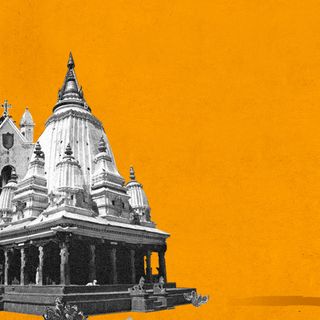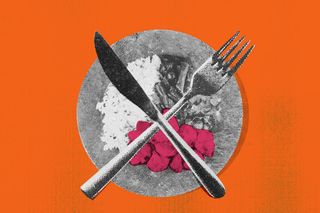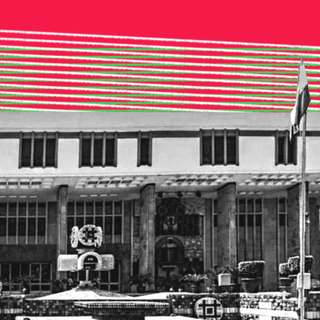
How Restricting Communities’ Access to Food Is a Form of Violence
Food-related restrictions, like the meat ban, harp on casteist and discriminatory notions of purity.

A strangeness sits within our political zeitgeist right now. Who has the right to food? What kind of food is acceptable? What happens to those who fall outside these blocks built by an unflinching moralmajority?
Bigotry has been on the plate for a while now. There was violence at sites of worship; then education was gatekept from Muslim women in the name of “discipline.” Food is the latest weapon to oppress identities as civil society and politicians alike rush to restrict communities’ access to food. A spate of meat bans in different states, along with instances of violence to prohibit people from consuming non-vegetarian food, have thundered across the nation in the last few weeks.
The politics of food has played out on the streets; among the bustle of the market; inside the invisible hierarchies that pervade kitchens. This is a sensitive topic to bring to any Indian table, for religious ideals have succeeded in selling specificdiets and ideological assertions. Vendors are prohibited in some parts to sell meat; eating chicken in a hostel mess is enough to rattle sensibilities; the whiff of chicken swiftly inspires rallies celebrating a Hindu festival to unbiddenly chant slogans against a minoritized community.
The link between food and a communities’ identity is a good start to understanding these patterns of violence. Beyond arguments of personal choice and liberty, food and culinary traditions are fundamental for the constitution of a collective identity. At the same time, these histories of food carry with “them generations of pain, the cuisines forged from centuries of oppression,” as an article noted. India is not a “vegetarian” country; but it still becomes a marker of majoritarian, privileged caste identity. The “food hierarchy is a function of the caste structure,” a 2018 paper noted. India has a shameful history of discriminating against, killing, and torturing people for non-vegetarian food under the tenets of Brahmanism.
Statistics steadily show that meat consumption is growing in India. “Experts say surveys also routinely underestimate meat-eating because people of lower castes might be more reluctant to disclose it,” as a BBC article noted. That India is a vegetarian country is a myth and has been one; it is perpetuated by stigmatizing eating habits.
The justification for inflicting violence over food comes from the neatly-dressed idea of “purity” and “morality.” Two issues co-exist. The oft-cited myth that people who eat non-vegetarian food (and the perception is that Muslim communities consume the larger share) have “aggressive” tendencies and defy the inexplicable laws of morality. Two, eating beef hurts Hindus‘ religious sentiments. Vegetarianism then carries the misplaced mantle of righteousness and virtuosity.
Related on The Swaddle:
Media Framing the JNU Violence Over Non‑Veg Food as a ‘Clash’ Condones the Assault
Food-related restrictions, like the meat ban that many states declared to not offend a religion’s sensibilities, then harp on this notion of religious and casteist ideas and purity to substantiate it. It ignores how many Indian Muslims are forced to go meatless — not to mention most vendors and shops are owned by Muslims so their business disproportionately suffers. These are targeted at one particular community and become a form of targeted political violence.
Targeted attacks against Muslims, vandalism of Muslim shops in BJP-ruled states like Uttar Pradesh and Karnataka, calls for boycotting halal meat — these instances don’t exist in silos. They become a deliberate campaign to socially and economically disempower and invisibilize the Muslim community. “The first thing leaders do to introduce an us-them dichotomy is introduce dietary rules. It’s the best thing: What do we eat? What do they eat?” as an article in the Atlantic explained of the link between politics, religion, and food.
Farah Naqvi, activist and author of Working with Muslims: Beyond Burqa and Triple Talaq, told Article 14: “You’ve got to be blind, not to join the dots. The fundamental issue is that there is an open season targeting an entire community and their constitutional rights, social, cultural and economic.”
In the end, restrictions around non-vegetarian food violate the right to exist. More than that, they normalize and validate the justifications of purity that are casteist and classist in nature; disenfranchise marginalized groups; dehumanizes them by increasing the level of scrutiny.
Senior Advocate Vrinda Grover referred to the meat ban as a “majoritarian writ enforced without any mandate of the law.” The whole saga then becomes a politically inflated argument — ironically without meat.
In today’s India, there’s something indigestible about eating non-vegetarian food. Correction: there’s something indigestible about Muslims eating meat in a hostile country hell-bent on dehumanizing them.
Saumya Kalia is an Associate Editor at The Swaddle. Her journalism and writing explore issues of social justice, digital sub-cultures, media ecosystem, literature, and memory as they cut across socio-cultural periods. You can reach her at @Saumya_Kalia.
Related


Cannot ‘Insist’ Trans Persons to Undergo a Sex‑Change Operation to Get Passport: Delhi HC
